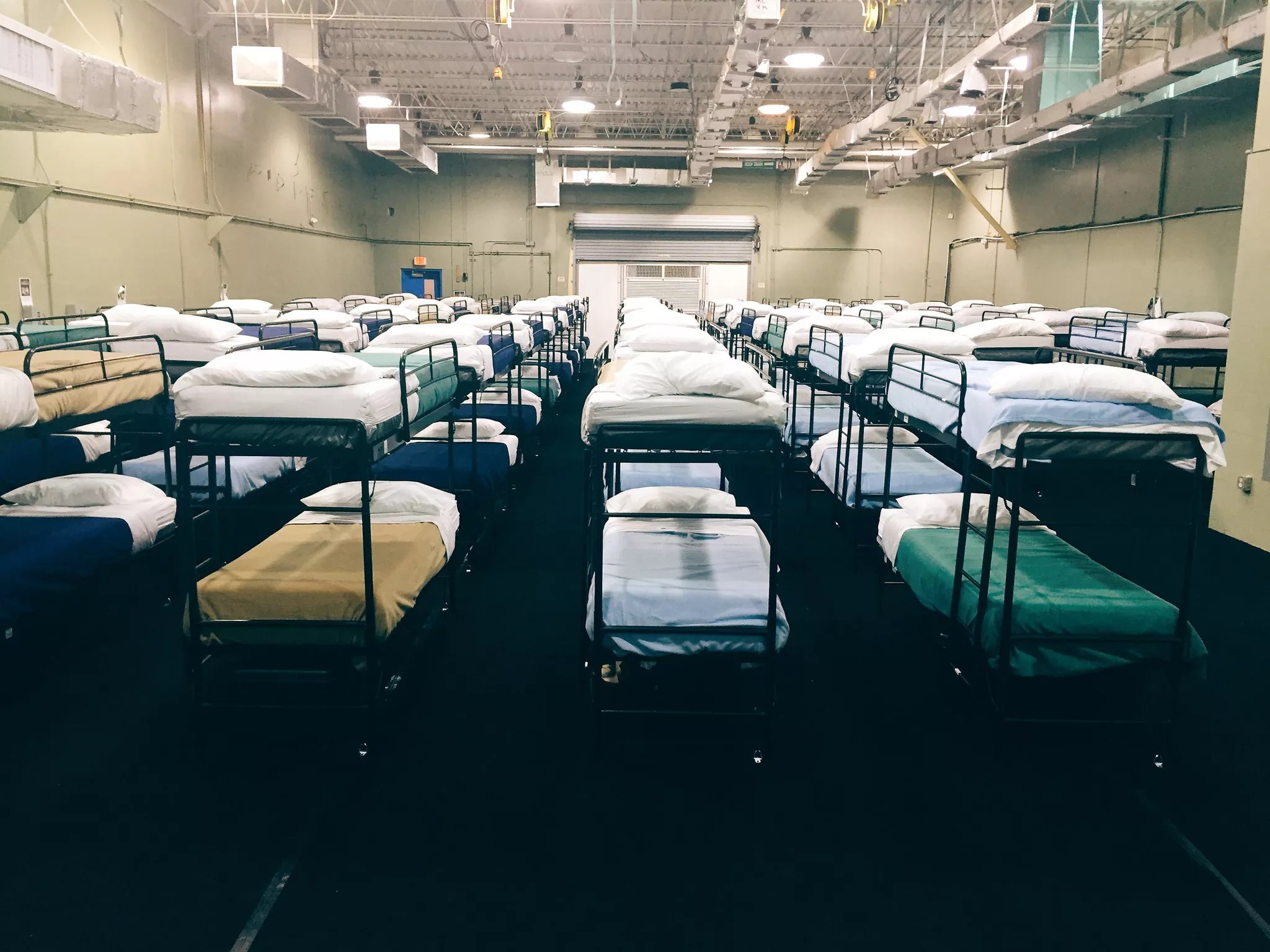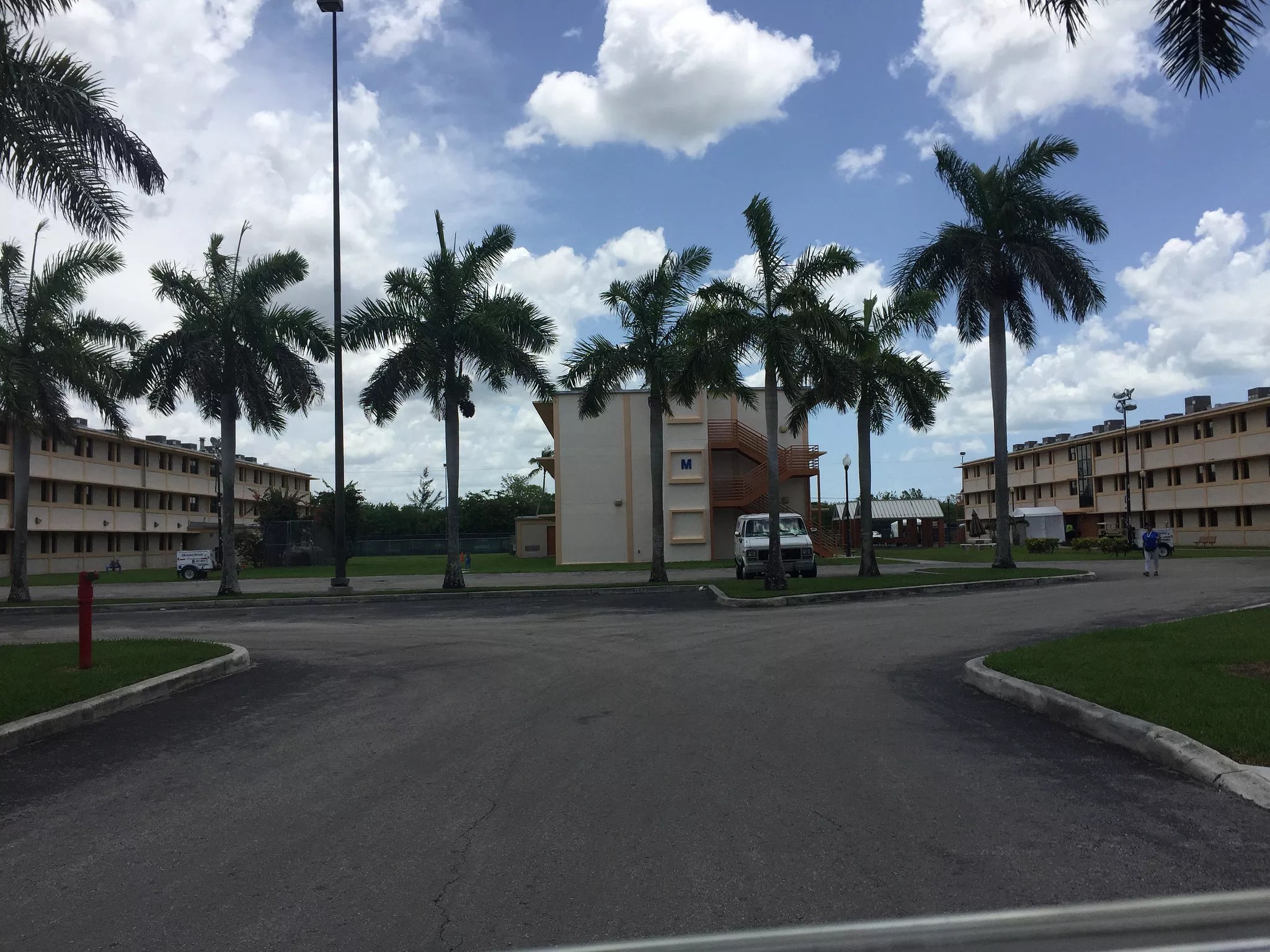
U.S. Department of Health and Human Services / Flickr

Audio By Carbonatix
Roughly 1,000 migrant children are being held inside a secured compound in Homestead, U.S. Rep. Debbie Wasserman Schultz said today. It’s unclear whether the children crossed the border on their own or whether they were taken from their parents under President Trump’s new policy, which the United Nations says violates international law and which Catholic leaders have decried as “evil.”
The beige prison-like facility outside Miami, called the Homestead Temporary Shelter for Unaccompanied Children, is the former Job Corps site at 960 Bougainville Boulevard. The facility opened under the Obama administration and was previously used to house unaccompanied migrant children.
Reporters last toured the facility in 2016, when the Miami Herald reported that about 200 children were being held there. But at a roundtable discussion today with immigrant-rights activists, Wasserman Schultz said the facility recently “reopened” under Trump. An immigrant activist who spoke with New Times today said the facility reopened “two months, three months” ago.
But there’s little information about where exactly the children inside came from. In 2016, the Herald reported that the kids arrived unaccompanied across the border and had been flown in from around the country; they were either sent back home or placed with sponsors and spent an average of about a month in Homestead. At the time, the federal government said the facility was equipped to hold only 800 kids.
Under Trump’s new directive, more than 2,000 children have been separated from their parents so far. As many as 30,000 youngsters could soon find themselves sent to detention centers under the plan.
A New Times reporter visited the Homestead facility grounds today. The prison-like compound sits near the Homestead Air Reserve Base in a sparsely populated stretch of Miami-Dade. When a reporter drove up to the front entrance (underneath a sign reading “Homestead Temporary Shelter for Unaccompanied Children”), guards refused to let the reporter in or speak with anyone from the facility. The guards instead directed New Times to contact the Office of Refugee Resettlement for comment and then ordered the reporter to leave.
The U.S. Office of Refugee Resettlement, which operates child-migrant camps on behalf of the federal government, did not respond to multiple requests for comment today from New Times. Staffers in Wasserman Schultz’s office also did not respond to more requests for comment today about the source for their figure of 1,000 children being held at the facility.
We met with Rep. @DWStweets to discuss the horrible policy of separating immigrant families by putting children in detention centers. A detention center for children in Homestead, Florida has just reopened and it currently holds over 1,000 kids. #FamilesBelongTogether pic.twitter.com/66Rrd8pgD3
— Tomas Kennedy (@tomaskenn) June 18, 2018
The Homestead site was first opened as a “temporary” facility to handle a surge in child migrants apprehended at or near the U.S. border around 2016.
As of two years ago, the detainees had access to regular classes and exercise times, but they were also banded with tracking bracelets that were scanned whenever they entered or exited buildings. Armed guards stood watch in nearly every portion of the facility. Kids were allowed two calls per week outside the facility to family members or guardians. The children were able to play sports outside and videogames and board games indoors, but they were not allowed to have visitors and weren’t allowed on the internet. Reporters who visited in 2016 were not allowed to interview kids at the compound.
“Some children have issues regarding them not feeling like human beings because of the different things they have to go through, like vaccinations, which is fine; it’s blurry,” Liz Marie Alvarado, immigration coordinator of American Friends Service Committee, told the Herald that year. “Sometimes it blurs the line between dignity and respect.”
The federal government even uploaded its own photo album from the reporters’ visit that day. The images show a doctor’s office, game rooms, and classrooms but also depict cavernous rooms full of prison-style bunk beds and makeshift tents where children are fed. It’s unclear if anything has changed at the facility since Donald Trump was inaugurated in 2017.
Starker photos from inside a child-detention facility in McAllen, Texas, have infuriated much of the world this week. MSNBC obtained photographs of children and adults being housed separately in cages and left with little more than metal benches, pads that look like yoga mats, and thin emergency blankets made from plastic sheeting for sleeping.
The images have been condemned around the world as inhumane and similar to concentration camps, but U.S. Sen. Marco Rubio defended the president’s move, which was intentionally drafted by adviser Stephen Miller to terrify immigrants and, in his words, “discourage” them from traveling to the United States.

U.S. Department of Health and Human Services / Flickr
A few minutes after being ordered to leave the Homestead facility today, a New Times reporter sat inside her car, which was idling in the driveway. The guards at the gate then ordered the reporter off the premises and threatened to arrest the reporter if she didn’t leave immediately. The guards placed their hands on their weapons when speaking.
Before leaving, the New Times reporter asked if the facility was holding detained children. A guard smiled and shrugged. “I don’t know,” the guard said.